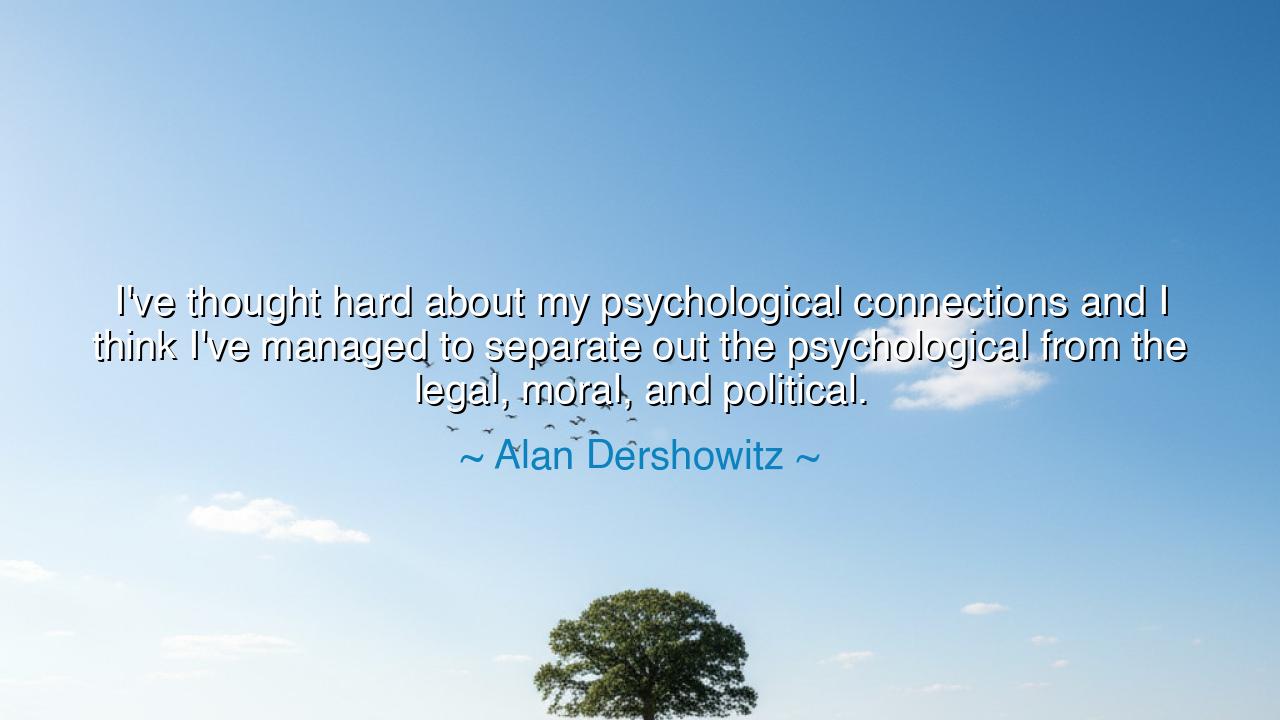
I've thought hard about my psychological connections and I think
I've thought hard about my psychological connections and I think I've managed to separate out the psychological from the legal, moral, and political.






When Alan Dershowitz said, “I’ve thought hard about my psychological connections and I think I’ve managed to separate out the psychological from the legal, moral, and political,” he was not simply analyzing himself — he was unveiling the eternal struggle between emotion and reason, self and duty, heart and justice. These words are born of a mind that has walked the thin line between advocacy and introspection. They reveal the wisdom of a man who knows that to pursue truth, one must first conquer the storms within — for only when the psychological is mastered can one perceive the legal, moral, and political with clarity.
In every age, those who deal in justice have faced this same trial. The judges of Athens, the senators of Rome, the philosophers of the East — all wrestled with their inner selves as fiercely as with their opponents. To separate the personal from the universal is a work not of intellect alone, but of spirit. For the mind, when clouded by passion or pain, turns even noble causes into mirrors of its own turmoil. Dershowitz, long immersed in the world of controversy and high stakes, speaks as one who has seen how emotion, if left unexamined, can distort law into vengeance, and morality into vanity.
The psychological represents the private kingdom of fear, desire, and bias. It is the echo of childhood, the shadow of ego, the hunger for victory or vindication. To separate it from the legal, moral, and political is to purify judgment — to ensure that decisions are made not in the service of self, but in service of truth. In ancient China, Confucius taught that the noble person must “rectify the heart” before he governs the state. Likewise, Dershowitz’s reflection reminds us that the truest discipline is not of others, but of oneself. A mind undisciplined by self-awareness will twist even the finest ideals into weapons of self-deception.
History offers us the cautionary tale of Pontius Pilate, the Roman governor who could not make this separation. Torn between his political ambitions, his moral hesitation, and the pressure of the crowd, he condemned the innocent to death. His hands were washed, but not his conscience. The failure to separate inner conflict from outer judgment turned justice into tragedy. Dershowitz’s insight stands as the antidote to that failure: to think deeply, to know one’s own inner motives, and to draw the line where personal feeling ends and duty begins.
But to achieve this separation is no small triumph. It requires humility — the acknowledgment that our inner world is a maze of illusions. It demands that we hold our psychological drives at a distance, examining them as a philosopher examines his own thoughts. To “manage to separate out” as Dershowitz says, is to step into mastery — to let reason rule passion, and principle rule pride. It is the discipline of a sage, the restraint of a warrior who conquers not the world, but himself.
This quote also carries a universal teaching for all who live in a world of debate and division. In every argument, every cause, every moral stand, one must ask: Do I speak from truth, or from the wound within me? The true servant of justice must silence the trembling of the ego before raising the voice of conviction. For when we act from unexamined emotion, we are not guided by morality, but by psychological projection — mistaking our pain for righteousness, our desire for justice.
So let this be the lesson passed down: self-knowledge is the first pillar of wisdom. Before one can rule a court, a nation, or even a household, one must rule the inner kingdom of thought and feeling. Alan Dershowitz’s reflection is not the pride of detachment, but the humility of discipline. It calls each of us to look inward before we speak outward — to cleanse our motives as a priest cleanses his altar. For when the psychological is purified and the moral stands clear, then — and only then — can justice shine like the morning sun, unclouded and eternal.






AAdministratorAdministrator
Welcome, honored guests. Please leave a comment, we will respond soon